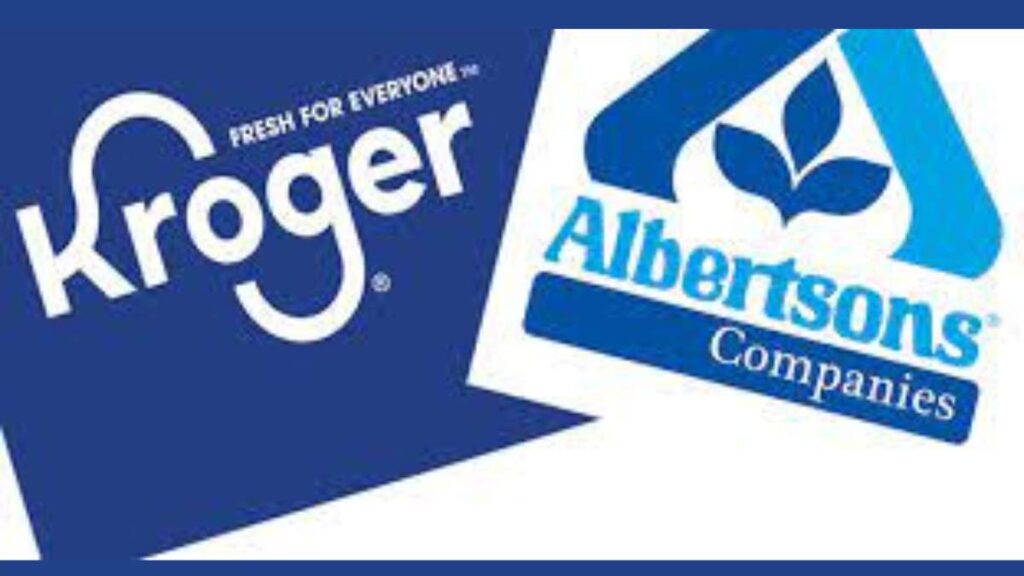The two biggest grocery store chains in the United States would join if Kroger and Albertsons go into business together in a $24.6 billion agreement, the firms announced recently.
As the acquisition would create a new grocery colossus at a time of skyrocketing food prices, it is expected to come under close scrutiny from federal authorities and opponents. When compared to September of last year, grocery costs increased 13%.
Kroger
With 420,000 people and over 2,700 shops, including Ralphs, Harris Teeter, Fred Meyer, and King Soopers, Kroger is the largest grocery chain in the United States. With 290,000 employees and nearly 2,300 locations, including Safeway and Vons, Albertsons is the second-largest supermarket chain in the nation.
They cross paths in a number of markets, primarily in the west of the nation. According to the corporations, their partnership would require spinning off up to 375 locations into a different company.
Kroger Investment
According to the announcement made on Friday, Kroger would “reinvest nearly half a billion dollars of cost savings through synergies to cut prices for customers” and would invest $1 billion to increase pay and benefits for employees.
The national big-box retailer Walmart, which sells more groceries than Kroger and Albertsons put together, is a significant rival for both businesses. The fastest-growing sector of American retail, dollar stores, as well as Costco and Amazon, both of which provide online delivery, compete with the two.
Antitrust officials in the Biden administration have argued for reforms in the way the government handles mergers and have opposed megadeals due to their disproportionate impact on consumer prices and competition.
Competitors
The largest grocery store currently is Walmart, which produced $218 billion in food sales last year, or 55% of its U.S. revenue. Although Amazon is a minor player in the market, it is exerting pressure on rivals as it expands into it after purchasing Whole Foods in 2017. Amazon also sells groceries on its website.
This sector of the economy is at a turning point since early in the epidemic, when consumers ate the majority of their meals at home, revenues and earnings skyrocketed. Inflation is eroding retailer profit margins, consumers are eating out more frequently than they did two years ago, and some customers are switching to Walmart and other less costly stores.
However, it doesn’t appear that much of it hurt the business’s bottom line. Kroger’s operating profits in the most recent quarter, which concluded on August 13, increased by 13.7 percent from a year earlier, enabling it to increase its dividend to investors by 24 percent. Additionally, it has bought back $975 million worth of its own shares this year.
Kroger and Albertsons will likely make the case to authorities that their combined size is necessary to compete with retailers like Aldi and Lidl, two European chains that have been rapidly growing in the US, as well as Walmart, Amazon, and Costco.
Conclusion
This report is from August 6, 2018. The Kroger Co. and Albertsons have entered into a definitive merger agreement under which the companies will combine in an all-stock merger of equals. The combined company will operate under the name “Kroger” and be headquartered in Ohio, with a leadership team in place by the time the transaction is expected to close early in the second quarter of 2019. The combined company will have approximately 2,800 stores and more than 400 distribution centers.
FAQs
Ans. 14, 2022 Aktuell 6:28 PT. In an era of rising food prices and more rivalry for consumers’ dollars, Kroger’s $20 billion offer to buy smaller rival Albertsons would combine several well-known Southern California grocery chains, including Ralphs and Vons, to form a supermarket monster.
Ans. The $24.6 billion acquisition of Albertsons by the grocery behemoth Kroger was revealed on Friday, and it might transform the American supermarket scene.
Ans. According to data from Insider Intelligence, Albertsons has a 4.5 percent market share while Kroger holds a 9% portion of the U.S. grocery market. In contrast, according to data from Euromonitor as published by Reuters, Walmart owns a 25% market share.
Ans. The almost $25 billion acquisition of Albertsons by Kroger, which was announced on Friday, has the potential to transform the US retail market and alter how millions of consumers shop for food.
Related articles-
Lithic Raises $43M in Series B Funding
Neostox: Advanced Trading Simulation Platform
